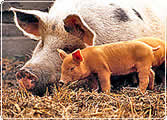The ethical balance: choice and fairness
Keeping the balance of interests between animals, the environment, the farmer and the retail chain is among the most complex of current political challenges. The well-being of consumers, farmers and animals is dependent upon a balance of autonomy (choice) and justice (fairness). This balancing act is fraught with ethical dilemmas.
For farmers, their well-being depends upon whether they have a satisfactory income and whether their farms thrive. This will be achieved by a balance of how free they are to manage their land, crops and animals (autonomy) and how fair they can be in selling on their produce (justice).
For the animals, their well-being will depend upon the care given them. This will determine the extent to which they can engage in their natural behaviour, and how they are respected for their intrinsic value.
It is the interests of the consumers that cause the ethical problems. For example, bacon is cheaper for consumers (in the interests of their well-being and autonomy) if the breeding sow is kept tethered in a stall to prevent her from rolling onto the piglets and crushing them. However this compromises the well-being and autonomy of the sow and the fairness for her.

 Should consumers be forced to pay more for bacon in order to protect the welfare of the sow?
Should consumers be forced to pay more for bacon in order to protect the welfare of the sow?
Briefly describe the ethical issues raised by the interests of a) a dairy farmer and b) a dairy cow in terms of well-being, autonomy and justice for each of them. Would these issues be different in a developing country?
 Food production today
Food production today

What's your opinion?
Average rating




Not yet rated